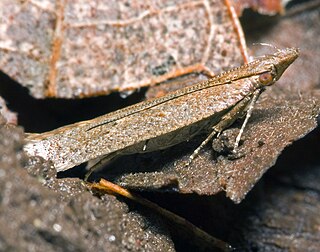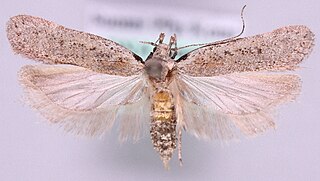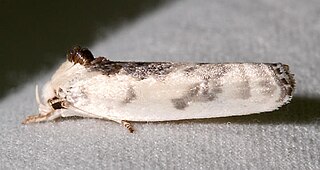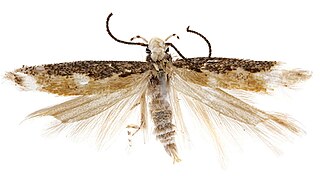
The Gelechiidae are a family of moths commonly referred to as twirler moths or gelechiid moths. They are the namesake family of the huge and little-studied superfamily Gelechioidea, and the family's taxonomy has been subject to considerable dispute. These are generally very small moths with narrow, fringed wings. The larvae of most species feed internally on various parts of their host plants, sometimes causing galls. Douglas-fir (Pseudotsuga) is a host plant common to many species of the family, particularly of the genus Chionodes, which as a result is more diverse in North America than usual for Gelechioidea.

The Lecithoceridae, or long-horned moths, are a family of small moths described by Simon Le Marchand in 1947. Although lecithocerids are found throughout the world, the great majority are found in the Indomalayan realm and the southern part of the Palaearctic realm.

The Archipini are a tribe of tortrix moths. Since many genera of these are not yet assigned to tribes, the genus list presented here is provisional.

Dichomeris is a genus of moths in the family Gelechiidae erected by Jacob Hübner in 1818.

Gelechia is a genus of moths in the family Gelechiidae. The type species is Gelechia rhombella.

Hypatima is a genus of the twirler moth family (Gelechiidae). Among these, it belongs to a distinct lineage, which is variously treated as tribe Chelariini in subfamilies Dichomeridinae, Gelechiinae, or even Pexicopiinae, and historically was considered a subfamily in its own right, Chelariinae. Of this lineage, Hypatima – under its junior synonym Chelaria – is the type genus. This genus has numerous species, but its exact limits are not quite clear. This genus occurs mainly in the Southern Hemisphere, though one of the better-known species is the only member of this genus native to Europe, the lobster-clawed moth.
Tecia is a genus of moths in the family Gelechiidae.

Glaucocharis is a genus of moths of the family Crambidae described by Edward Meyrick in 1938.
Aphilopota is a genus of moths in the family Geometridae described by Warren in 1899.

Crocanthes is a genus of moths in the family Lecithoceridae.

Lecithocera is a genus of moths in the lecithocerid subfamily Lecithocerinae. The genus was erected by Gottlieb August Wilhelm Herrich-Schäffer in 1853.
The Eucosmini are a tribe of tortrix moths.

The Depressariinae – sometimes spelled "Depressiinae" in error – are a subfamily of moths in the superfamily Gelechioidea. Like their relatives therein, their exact relationships are not yet very well resolved. It has been considered part of family Elachistidae sensu lato or included in an expanded Oecophoridae. In modern classifications they are treated as the distinct gelechioid family Depressariidae.

Antaeotricha is a genus of moths. It is the largest genus in the subfamily Stenomatinae, numbering over 400 species in the Western Hemisphere.

Caloptilia is a genus of moths in the family Gracillariidae.

Acrocercops is a genus of moths in the family Gracillariidae.
Tecia Lyn Torres Moncaio is an American mixed martial artist who is currently competing in the strawweight division of the Ultimate Fighting Championship (UFC). As of October 25, 2021, she is #8 in the UFC women's strawweight rankings.

Gelechiinae is a subfamily of moths in the family Gelechiidae. It was described by Henry Tibbats Stainton in 1854.

Stenoma is a genus of moths. The type species is Stenoma litura, which was described by Philipp Christoph Zeller in 1839.
Chlamydastis is a genus of moths in the subfamily Stenomatinae.













